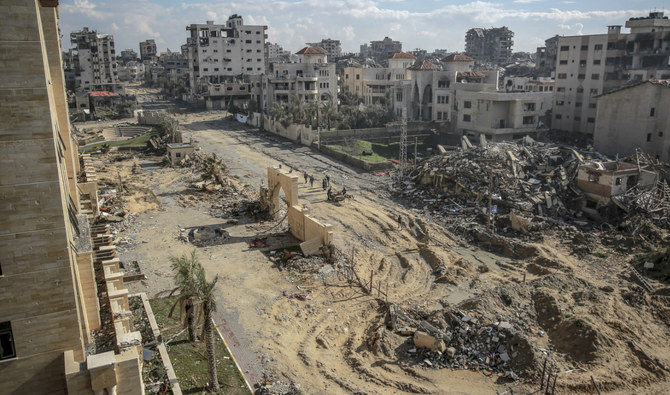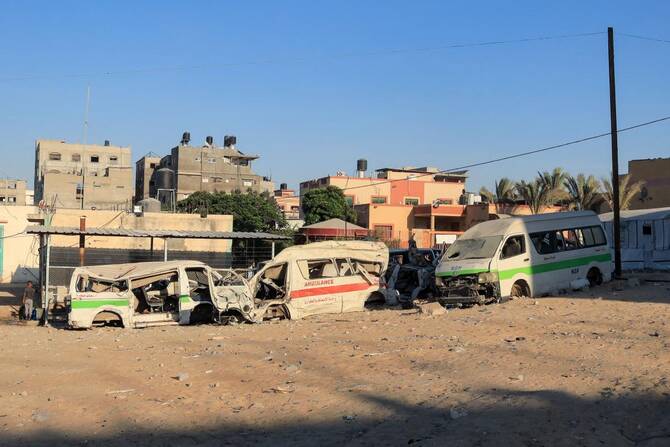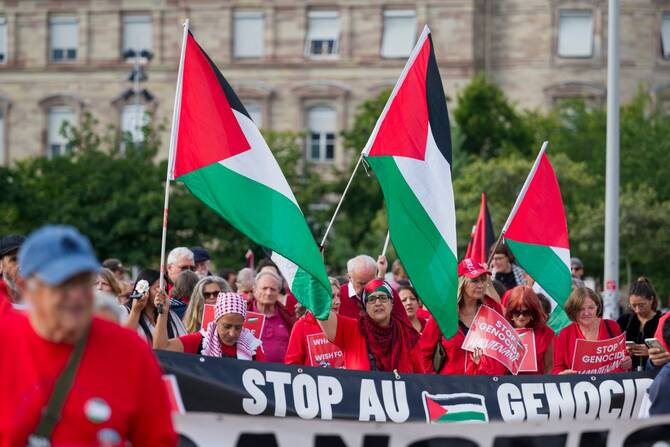NEW YORK: In one of the most powerful speeches delivered at the UN Security Council since beginning of the war in Gaza, the secretary-general of the international medical humanitarian organization Doctors Without Borders (Medecins Sans Frontieres) on Thursday called for the UN body to demand an immediate ceasefire in Gaza and ensure protection of health facilities, workers and patients.
He said the world is watching council members “deliberate and delay while civilians die,” and expressed outrage at the recent US veto that prevented the adoption of “the most evident of resolutions, one demanding an immediate and sustained ceasefire.”
Christopher Lockyear said: “Three times this council has had an opportunity to vote for the ceasefire that is so desperately needed. And three times the United States has used its veto power.”
He said the draft resolution tabled by the US last week to rival the Algerian draft it vetoed and “ostensibly” calling for a ceasefire is “misleading at best.”
Although the draft in question does support a call for a ceasefire, it refers to it as a temporary measure that needs to be enacted “as soon as practicable,” which many have understood as leaving the decision for its implementation to the Israelis.
Lockyear called on the council to reject “any resolution that further hampers humanitarian efforts on the ground and leads this council to tacitly endorse the continued violence and mass atrocities in Gaza.”
He added: “The people of Gaza need a ceasefire, not when practicable, but now. They need a sustained ceasefire, not a temporary period of calm. Anything short of this is gross negligence. The protection of civilians in Gaza cannot be contingent on resolutions from this council which instrumentalize humanitarianism to blur political objectives.”
Lockyear painted an apocalyptic picture of the situation in Rafah, the last refuge for Gazans, where over 1 million displaced Palestinians are sheltering and which is now being engulfed with fear of a ground invasion.
Over four months of war have killed nearly 30,000 Palestinians in Israel’s constant bombing and attacks, according to MSF.
More than 1.7 million are estimated to have been forcibly displaced and facing infected wounds and disease, as the organization says providing healthcare is becoming “virtually impossible” in Gaza, where medical facilities have not been safe from military attacks.
“Our patients have catastrophic injuries, amputations, crushed limbs and severe burns,” Lockyear said.
“They need sophisticated care. They need long and intensive rehabilitation. Medics cannot treat these injuries on a battlefield or in the ashes of destroyed hospitals. Our surgeons are running out of basic gauze to stop their patients from bleeding out. They use it once, squeeze out the blood, wash it, sterilize it, and reuse it for the next patient.
“The humanitarian crisis in Gaza has left pregnant women without medical care for months. Women in labor cannot reach functional delivery rooms. They are giving birth in plastic tents and public buildings.
“Medical teams have added a new acronym to their vocabulary, WCNSF: Wounded child, no surviving family.
“Children who do survive this war will not only bear the visible wounds of traumas and injuries, but the invisible ones to those of repeated displacements, constant fear and witnessing family members being literally dismembered before their eyes. These psychological injuries have led children as young as 5 to tell us that they would prefer to die.”
On Feb. 20, a MSF staff member’s wife and daughter-in-law were killed and six other people were injured when an Israeli tank fired on a clearly marked MSF staff shelter in Al-Mawasi in Khan Younis.
Israeli forces last week evacuated then raided Nasser Hospital, the largest remaining medical facility in southern Gaza. Those who were forced out have nowhere to go, said MSF. They cannot move back to the now largely destroyed north, and in Rafah they live amid constant Israeli airstrikes and the fear of an extensive ground incursion.
Since the beginning of the war in Gaza, MSF medical teams and patients have been forced to evacuate nine different healthcare facilities in the Gaza Strip. Five MSF workers have been killed. Today’s MSF efforts to help are “entirely inadequate,” said Lockyear.
He added: “For 138 days we have witnessed the unimaginable suffering of the people of Gaza. For 138 days we have watched the systematic obliteration of a health system we have supported for decades. We have watched our patients and our colleagues be killed and maimed. This situation is the combination of a war Israel is waging on the entire population of the Gaza Strip; a war of collective punishment, a war without rules, a war at all costs.
“The laws and the principles we collectively depend on to enable humanitarian assistance are now eroded to the point of becoming meaningless.
“The humanitarian response in Gaza today is an illusion. A convenient illusion that perpetuates a narrative that this war is being waged in line with international laws. Calls for humanitarian assistance have echoed across this chamber. Yet in Gaza, we have less and less every day: less space, less medicine, less food, less water, less safety. We no longer speak of a humanitarian scale up. We speak of how to survive even without the bare minimum.”
Lockyear said the Israeli attacks against medical facilities and staff have become now “all too familiar.”
He said: “Israeli forces have attacked our convoys, detained our staff, bulldozed our vehicles. Hospitals have been bombed and raided.
“This pattern of attacks is either intentional or indicative of reckless incompetence. Our colleagues in Gaza are fearful that as I speak to you today, they will be punished tomorrow.”
Lockyear cautioned against casting international humanitarian law to the wind as that “will reverberate well beyond Gaza. It will be an enduring burden on our collective conscience. This is not just political inaction: It has become political complicity.”
The humanitarian official demanded from the Security Council “the protections promised under international humanitarian law,” and a ceasefire from both parties.
Lockyear asked council members: “We demand the space to turn the illusion of aid to meaningful assistance. What will you do to make this happen?”






















